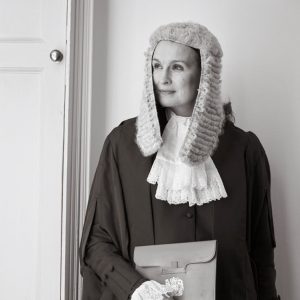Sophie Cartwright QC – Deans Court Chambers, Manchester
 Sophie Cartwright QC, who is a recognised leader in administrative and public law, inquests and inquiries, professional discipline and health and safety, was appointed to silk in the 2020 competition. Sophie – who also sits as a Recorder in the Crown Court on the Northern Circuit and as an Assistant Coroner – was raised in Lancashire and attended St Augustine’s Roman Catholic High School in Billington and took her A levels at Blackburn College. With no familial connections with the legal profession, Sophie discovered her vocation when a friend of her father arranged for Sophie to do work experience with Tony Cross QC (now a Circuit Judge). This was a life-changing encounter: “Tony provided incredible encouragement and kindness”, an experience “replicated many times and so characteristic of the Bar”, said Sophie.
Sophie Cartwright QC, who is a recognised leader in administrative and public law, inquests and inquiries, professional discipline and health and safety, was appointed to silk in the 2020 competition. Sophie – who also sits as a Recorder in the Crown Court on the Northern Circuit and as an Assistant Coroner – was raised in Lancashire and attended St Augustine’s Roman Catholic High School in Billington and took her A levels at Blackburn College. With no familial connections with the legal profession, Sophie discovered her vocation when a friend of her father arranged for Sophie to do work experience with Tony Cross QC (now a Circuit Judge). This was a life-changing encounter: “Tony provided incredible encouragement and kindness”, an experience “replicated many times and so characteristic of the Bar”, said Sophie.
Sophie secured a place in Warwick University’s law department to study for her LLB, and this was followed by attendance at the Inns of Court School of Law and studies for a master’s degree in health and safety and environmental law at Salford university. Sophie secured her pupillage at Deans Court, Manchester in 1998, where she has remained ever since. Stuart Denney QC was her pupil supervisor and has been another mentor and friend to her throughout her career. Originally working on criminal cases, Sophie began to specialise in public law, regulatory and disciplinary proceedings and inquests and public inquiries. Sophie’s practice now also encompasses judicial reviews, health and social care regulation and cases in the Court of Protection.
Amongst her many notable cases, Sophie served as counsel to the Anthony Grainger Inquiry concerning his fatal shooting in 2012. For the last three years, Sophie has “had the very great privilege” of serving as counsel to Sir John Saunders, Chairman of the Manchester Arena Inquiry investigating the deaths of the victims of the 2017 terrorist attack. Sophie considered it to be an “enormous privilege” to work with so many inspiring fellow practitioners, professionals and, particularly, the families of the victims of the terrorist attack.
In more recent years, in the build up to her QC application, inquests and inquiries have taken centre stage in Sophie’s career. There have been so many inspiring, kind, and supportive people in all aspects of her practice, but in inquest and inquiry work Sophie would give special mention to HHJ Thomas Teague QC, now Chief Coroner of England and Wales, his predecessor HHJ Mark Lucraft QC (now Recorder of London), Sir John Saunders and HHJ Clement Goldstone QC.
The silk ‘badge’ was “always in the background as an aspiration, spanning your career”, said Sophie. For her, it became a realistic seeming ambition when judges and highly respected professional colleagues – including opponents – began “sowing the necessary seeds” through comments regarding her suitability for the ‘step up’.
To those thinking about applying for silk at some future point, Sophie strongly advised that you become fully conversant with the QC selection process. In her experience the process was clear, but it was also quite complex and highly demanding. In the interview, for example, you had to evidence your excellence within a strict time-limit. You should thoroughly familiarise yourself with the application form and the “extremely helpful” QCA guidance, even quite early in your career. Against that knowledge, you needed to begin thinking strategically about your career choices e.g., in terms of the various sub specialisms within your practice area and the cases you took on in terms of their substance (as defined by the process) and opportunities that they seemed likely to provide in terms of demonstrating the competencies to the exacting standard of excellence, and in terms of potential assessors. This enabled you to build up a portfolio over the years but bearing in mind that the focus would be on your most recent cases. When you came to apply, it was a moment of deep self-reflection. You had to be totally honest with yourself regarding your suitability for the demands of the competition. Sophie said you needed to be certain that QC was not only something you could realistically aspire to, but also something you really wanted. Taking silk was a huge honour but it was not risk-free in terms of the shift you needed to make from having an established busy senior-junior practice to building a silk practice.
In your preparations it was vital that you thought closely about all of the competencies not just those concerned with the law and advocacy. The Selection Panel, profession and society at large wanted “fully rounded silk practitioners in a diverse society”. Sophie said that your dealings with people – colleagues, judges, practitioners (not least your opponents), clients and all those you came into contact in the work context such as court staff – had to be evidenced as excellent for you to succeed in the competition.
She had been, as usual, extremely busy on the Manchester Arena Inquiry when, in December 2020, Sophie received the advanced notice from QCA that she had been successful in the QC Competition. Sophie received congratulations from across the profession – with one very senior female judge particularly celebrating the fact the Sophie and other many other women had done so well in the competition. Sophie was “especially and particularly moved” by the congratulations she received from the families of the victims of the Manchester Arena terrorist attack, the people who Sophie had the great privilege of working closely with since 2019. The families made for Sophie a desk plaque with “Sophie Cartwright QC” to mark the occasion, which she will always treasure. It was “such a humbling honour working with and supporting the families”.
Sophie said that it had only been possible to juggle her extremely busy legal career with the demands of being a mother because of “the incredible support” of her husband Ed Morgan (also a QC appointed in the same competition) and family and friends. Sophie said she owed a massive debt of gratitude to her friend Pat Taylor. At a time when Sophie was experiencing some qualms about her continuing ability to ‘juggle’ home and work life, Pat made the remarkably kind offer to look after Sophie’s children so as to enable Sophie to return to her career. Very sadly, Pat died shortly before Sophie was made silk at the delayed (November 2021) QC swearing-in ceremony in the Palace of Westminster. It was a wonderful day, said Sophie, but also one tinged with sadness, thinking about Pat and how her friendship, encouragement, and incredible practical support had enabled her to return to the Bar and go on to take silk.
Sophie was extremely grateful for the work which Eleanor Platt QC had done over the years updating the list of all women appointed QCs since Helena Normanton KC and Rose Heilbron KC were the first two women to be made silk in 1949 (Eleanor Platt QC was the 19th woman silk in 1982). As at 2021 (before the 2021 results were announced), 530 women had been made silks, Sophie being number 516. Boosting these numbers had been an additional spur for Sophie in her decision to apply for silk, hoping that she might inspire other women to aspire to becoming a QC. Whilst the proportion of women to men practicing as QCs had steadily increased over the years (and women applicants were consistently more successful than their male counterparts in the competition) – in absolute terms, the numbers of women QCs was still small. There were currently 311 women practicing silks compared with 1514 men*. There was still a long way to go, said Sophie.
Sophie greatly admired the QC Selection Panel and the process. She liked its transparency and fairness and the way it tested and stretched you, and made you reflect deeply on yourself and your career. That half the Selection Panel’s membership came from high-level non-legal backgrounds and professions was particularly powerful, with its membership changing dynamically over time. Sophie was keen that her thanks to the Selection Panel and QCA staff were recorded, recognising that their work must have been particularly demanding during the pandemic. She had “no criticisms at all.”
- Date: March 6, 2022
- Category:

